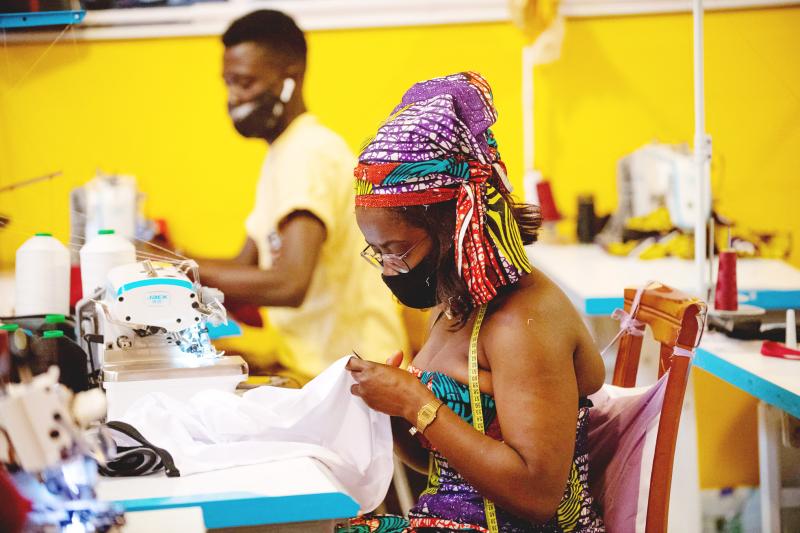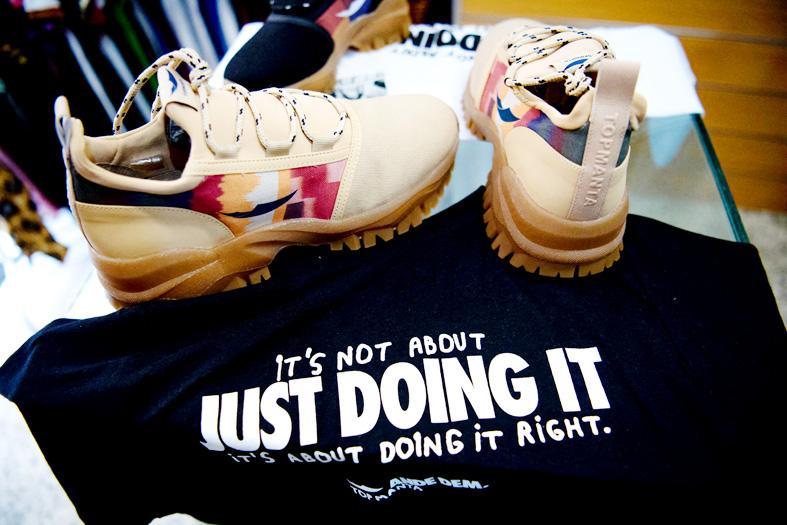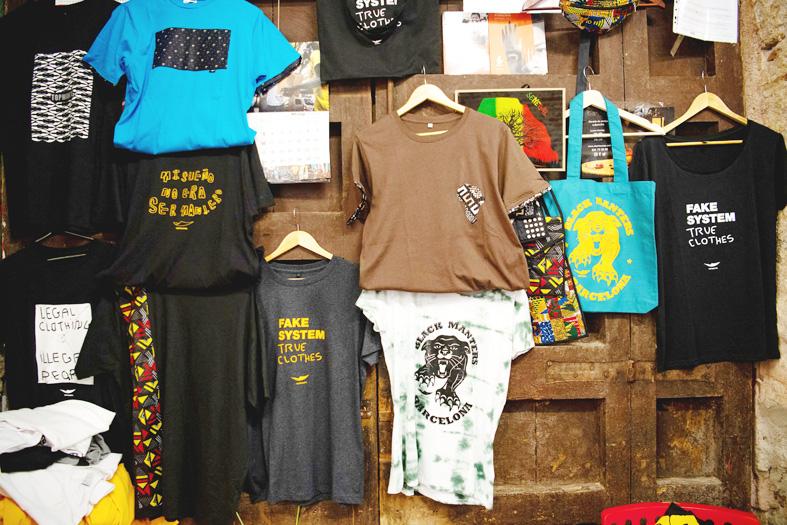When he left Senegal, risking his life to make the dangerous boat trip to Spain’s Canary Islands, Lamine Sarr never thought he would end up selling fake goods on the streets of Barcelona.
Known as manteros after the blanket on which they lay their wares, these street sellers live a precarious life, always on the lookout for the police, so Sarr decided to do something different: He helped set up the Barcelona Street Vendors Union, which has just launched its own brand of trainers in the hope of “changing the rules of the game.”
“As we were always selling counterfeit products, it gave us the desire to create a brand with our own designs and our own clothes,” 38-year-old Sarr said inside the union’s shop in Barcelona’s Raval neighborhood.

Photo: AFP
The name they have given the trainers is “Ande Dem,” which means “walking together” in Wolof, the most widely spoken language in Senegal. Behind the project is Top Manta, a clothing company set up in 2017 by the union, which is mostly made up of sub-Saharan Africans.
“When we first created the brand, we thought about trainers. We thought it would be easy, but we didn’t have the means,” Sarr said.
What better way to kick against the system than by giving those who are known for selling fakes on the streets of Barcelona their very own brand of shoes, made locally in Spain and Portugal.

Photo: AFP
The project has been two years in the making, with the manteros working with two local artists to create trainers made from sustainable, vegan-friendly materials that are produced in small local workshops rather than mass-produced.
With a robust sole, they come in black or tan with a strip of colors “reflecting Africa” and the Top Manta logo: a blanket, that also represents “waves” of the dangerous sea crossing many brave to reach Spain.
Launched earlier this month with a thought-provoking ad on Instagram where the collective has 63,000 followers, the trainers retail at 115 euros.

Photo: AFP
“Life is not like a trainer advert. We know the race is full of traps,” said a woman’s voice over footage of police racing after a migrant and wrestling him to the ground.
“It’s not about just doing it, it’s about doing it right,” she said, in a slogan with a clear spin on Nike Inc’s Just Do It campaign.
Sarr said that it is impossible to work as a street seller and not have problems with the law. For the union, the main aim is to get the manteros off the street where many end up no thanks to Spain’s immigration laws.
To get residency papers, the law requires non-EU citizens to prove they have been in Spain for three years, to show a one-year work contract, have a clean criminal record and more.
“How can you be in a place for three years without doing anything? I couldn’t believe it,” said Sarr who did not tell his family in rural Senegal that he was leaving for Europe.
Aftr a week-long sea crossing, he arrived on the island of Fuerteventura in 2006, eventually making his way to Barcelona.
However, it was only two years ago that he managed to leave his life as a mantero after the union helped him to obtain his papers, as it has done about 120 others. Today, there are about 100 street sellers working in Barcelona, according to City Hall figures.
It was the disappearance of tourists as a result of the COVID-19 pandemic that put an end to Oumy Manga’s five years working as a hawker on the streets. Wearing a colorful turban that matches her dress, this 32-year-old is focused on making a t-shirt at the Top Manta workshop where African tunes mingle with the rattle of sewing machines.
She is finishing a course in dressmaking as well as learning Spanish and Catalan.
“I don’t like selling, that’s why we’re here: learning things so we don’t go back on the streets,” said Manga from Senegal, who sewed masks and other protective gear at the start of the pandemic.
About 25 people work in this basement workshop that they acquired with help from City Hall, which has backed several of the union’s initiatives.
“The underlying problem comes from migrant influxes and a law on foreigners that is unrealistic,” said Alvaro Porro, who is commissioner for Social Economy, Local Development and Food Policy at Barcelona City Council. “In the end, it’s the cities who have to cope with the situation no thanks to a law that we cannot change.”
If she had known what was awaiting her, Manga said she would not have left her homeland.
“It’s very complicated, being here five years without papers or work,” she said.
Still without papers, she is hoping things might change given her newfound ally, the sewing machine.
“I’d like to carry on sewing, that’s my profession,” she said, dreaming of one day designing her own collection.
For now, it seems Top Manta has a future: So far it has sold all of its first batch of 400 pairs of trainers and is preparing to order another.

Taiwan would remain in the same international network for carrying out cross-border payments and would not be marginalized on the world stage, despite jostling among international powers, central bank Governor Yang Chin-long (楊金龍) said yesterday. Yang made the remarks during a speech at an annual event organized by Financial Information Service Co (財金資訊), which oversees Taiwan’s banking, payment and settlement systems. “The US dollar will remain the world’s major cross-border payment tool, given its high liquidity, legality and safe-haven status,” Yang said. Russia is pushing for a new cross-border payment system and highlighted the issue during a BRICS summit in October. The existing system

Taiwan Semiconductor Manufacturing Co (TSMC, 台積電) is expected to grow its revenue by about 25 percent to a new record high next year, driven by robust demand for advanced technologies used in artificial intelligence (AI) applications and crypto mining, International Data Corp (IDC) said yesterday. That would see TSMC secure a 67 percent share of the world’s foundry market next year, from 64 percent this year, IDC senior semiconductor research manager Galen Zeng (曾冠瑋) predicted. In the broader foundry definition, TSMC would see its market share rise to 36 percent next year from 33 percent this year, he said. To address concerns

Intel Corp chief financial officer Dave Zinsner said that a formal separation of the company’s factory and product development divisions is an open question that would be decided by the chipmaker’s next leader. Zinsner, who is serving as interim co-CEO following this month’s ouster of Pat Gelsinger, made the remarks on Thursday at the Barclays technology conference in San Francisco alongside co-CEO Michelle Johnston Holthaus. Intel’s struggles to keep pace with rivals — along with its deteriorating financial condition — have spurred speculation that the next CEO would make dramatic changes. That has included talk of a split of the company’s manufacturing

PROTECTIONISM: The tariffs would go into effect on Jan. 1 and are meant to protect the US’ clean energy sector from unfair Chinese practices, the US trade chief said US President Joe Biden’s administration plans to raise tariffs on solar wafers, polysilicon and some tungsten products from China to protect US clean energy businesses. The notice from the Office of US Trade Representative (USTR) said tariffs on Chinese-made solar wafers and polysilicon would rise to 50 percent from 25 percent and duties on certain tungsten products would increase from zero to 25 percent, effective on Jan. 1, following a review of Chinese trade practices under Section 301 of the US Trade Act of 1974. The decision followed a public comment period after the USTR said in September that it was considering